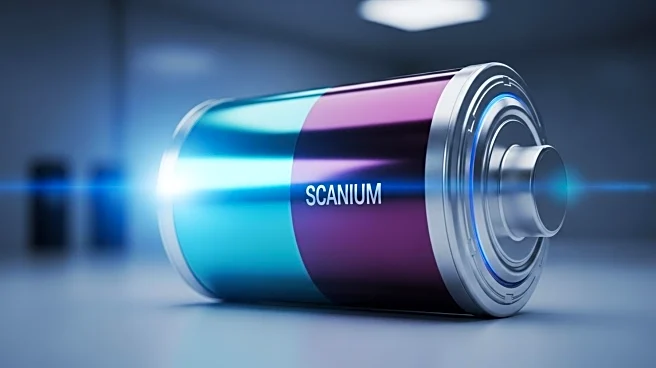What's Happening?
Researchers at the Tokyo University of Science have made a significant breakthrough in sodium-ion battery technology by introducing scandium doping to the cathode material. This innovation addresses the issue of rapid capacity fading in sodium manganese oxide cathodes, a common challenge in sodium-ion batteries. The addition of scandium enhances the structural integrity and performance of the batteries, potentially paving the way for more durable and efficient energy storage solutions. This development is part of ongoing global efforts to improve sodium-ion batteries, which are seen as a promising alternative to lithium-ion batteries due to sodium's abundance and lower environmental impact.
Why It's Important?
The enhancement of sodium-ion batteries through scandium doping represents a major step forward in the quest for sustainable and efficient energy storage solutions. As the demand for renewable energy sources grows, the need for reliable and environmentally friendly battery technologies becomes increasingly critical. Sodium-ion batteries, with their improved performance and reduced reliance on rare elements, offer a viable alternative to lithium-ion batteries. This advancement could have significant implications for the energy storage industry, potentially leading to more widespread adoption of renewable energy technologies and reducing the environmental impact of battery production.
What's Next?
Following this breakthrough, further research and development are expected to focus on optimizing the scandium doping process and scaling up production for commercial applications. The potential for sodium-ion batteries to replace or complement lithium-ion batteries in various applications, including electric vehicles and grid storage, will likely drive continued investment and innovation in this field. Additionally, the broader implications for energy policy and sustainability initiatives may lead to increased support for research and development in alternative battery technologies.
Beyond the Headlines
The introduction of scandium doping in sodium-ion batteries highlights the importance of material science innovations in addressing global energy challenges. As researchers continue to explore new materials and techniques, the potential for breakthroughs in energy storage and other technologies remains significant. The ethical considerations of resource use and environmental impact will play a crucial role in shaping the future of battery technology and its applications.









